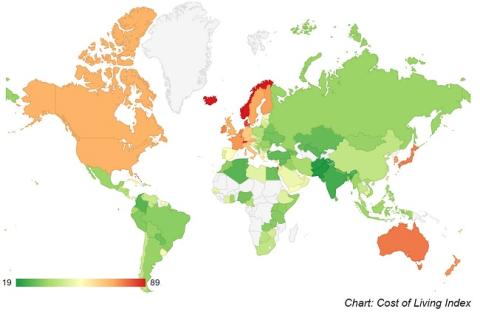Individuals
Moving Abroad Checklist – 10 Things To Do Before You Go

Making the decision to move abroad can be both an exciting and scary time of your life, and there are lots of preparations to ensure that everything goes smoothly.
Becoming an expat takes more than booking a flight and finding a new home. Before saying goodbye to your home country, you need to get organized, create a to-do list and make sure all your documents are in order. The last thing you want to do is forget something important that can hinder a successful move.
Below is a comprehensive moving abroad checklist that will help you to prepare for your life as an expat.
1. Get Vaccinated Before Moving To Another Country
Start by arranging a physical with your doctor, making sure you are healthy and that no mysterious health problems pop up while you’re away. Inform your doctor of your plans to move abroad and make sure you get a copy of your medical records that you can bring with you. You’ll want to have this information available in case you get sick in your new country and need to give a doctor your health history.
Find out what vaccines you need to enter your new country and arrange to get them at least a few months out. Some need more than one cycle and you don’t want to be denied entry into a country for not being properly vaccinated.
For example, in China, a vaccination for Malaria is recommended, as is one for Yellow Fever if traveling to Argentina and other countries. Certain countries are now more concerned about epidemics like polio, MERS, and measles.

Many international health insurance policies even require applicants to get specific vaccines in order to qualify for its health coverage.
For the full list of countries and recommended vaccinations, check the CDC Traveler’s Health site on current vaccinations or the United States Department of State site that includes detailed vaccination recommendations by country.
2. Understand Any Risk and Advisory Warnings
It only takes a glance of the news to understand that countries that seem safe today may not be tomorrow, so it’s necessary to truly understand the political and risk climate of any country you’re moving to.
Even the safest of countries may have travel warnings associated with it, and knowing these ahead of time can help prepare an expat making a move and living in a new home country.
Great resources for viewing up-to-date travel warnings include The U.S. Department of State Website, CDC Travel Health Notices, Gov.UK Foreign Travel Advice, and the Australian Government Department of Foreign Affairs and Trade.
Remember, even if a destination country is safe, there may be important travel advisories that need to be considered.
3. Remember Your Taxes
Just because you are moving to a new land doesn’t meant that you can escape your tax responsibilities of your home country. The U.S. is one of a handful of countries that vigorously pursues taxes worldwide, so being an expat won’t help as your worldwide income is subject to U.S. income tax, regardless of where you reside.
Check with your accountant or financial advisor before leaving to better understand the tax rules and requirements. For example, U.S. citizens do get a two-month extension on their taxes if living abroad and there are some expat tax exclusions you should be aware of.
Be sure to check out the IRS’s tax guide for citizens living abroad.
4. Consider Cost of Living
There’s probably a whole list of things you want to do in your new country. But some countries are notoriously expensive and you may quickly realize that you can’t afford to live, eat, shop and play the way you want because of economics.
Keep in mind that in some countries, additional expenses are incurred by expats, such as expatriate health insurance or property insurance that need to be accounted for.
A great place to prepare for the expenses you will incur living overseas is in Numbeo’s cost of living index, which allows expats to easily compare the differences between costs in their home countries with their new country of choice.

5. Understand the Healthcare System
When you get sick or injured, you may be used to simply making a doctor’s appointment and visiting your local MD for care, but in some countries, the healthcare system may not be as easy for visits or care. That’s why before you become an expat in a particular country, you should understand what’s in store for you if something was to happen.
Don’t assume you’re automatically covered by a country’s healthcare system. In fact, each country has a unique set of qualifications for receiving nationalized care.
In many countries, you are required to purchase health insurance as condition of being allowed to live there. For example, France required all expats to purchase insurance.
Personal international health insurance provides borderless coverage and safeguards expats against illnesses abroad particularly in the event of an emergency medical evacuation.
Some important things for all expats to be aware of before moving to another country include how to qualify for healthcare, what is needed, what medical treatments are available, how you pay for care and if a national system is in place.
6. Know How to Get Around
One of the things that should be on your moving abroad checklist is solving your transportation issues and knowing how you will get to work, go shopping, and go out. Some countries have reliable, easy-to-use transportation systems, while others will require you to have our own personal vehicle. Be sure to research what your new country offers and understand how you will get around. If public transportation is an option, learn how to use the system and what payment (such as a card) is required.

Laws are different in each country as well. In the UK and Europe there are important road rules you don’t want to break. For example, drivers drive on the other side of the road, and the rules of passing and turning are different as well. Different countries have different road signs, as well, so it’s important to understand the different traffic laws and rules of the road. You may even need to consider obtaining an international driving permit in certain countries if you plan on driving there once you move.
If private transportation is needed, make sure you know the best way to purchase a vehicle. You will need to have an international car insurance plan when driving abroad. You should look into if it includes political violence coverage, which protects damage to your car resulting from riots, strikes, and terrorism. You should also look into getting excess liability for supplemental coverage in case if third party liability purchased from local providers doesn’t provide enough coverage.
7. Have Passports and Visas Ready
It might not just be enough to have a passport when moving to a another country, especially if you’re planning on working. The U.S. Department of State offers a comprehensive list of the documentation requirements for each country, so be sure to check that out early in the process so you have time to get whatever is necessary in time for the move.
Many countries now require passports to be valid for up to six months before you plan to leave a country. Even if your passport is valid for another 9 months, but you plan on being an expat for half a year, it won’t be enough time. Remember, renewing a passport while abroad is not going to be as easy as it is in your home country.
For those moving to a country that requires a work visa, the documents you need to enter a country differ depending on your reason for visiting that country. Therefore, you should make sure to apply for the right visa that meet your needs. Find out the ins and outs of obtaining an international work visa.
8. Bring Money Accepted In Your New Home Country
You don’t want to arrive in your new country without any proper currency, as odds are, taxis, stores and restaurants are not going to take money from your home country. Plus, if you exchange it in the new country, you’re not going to get a high return. Airports are notorious for low exchange rates.
Your best bet is to go to your bank at home at least a month before planning to move to order the currency you will need. One mistake a lot of people make is not having enough cash on hand. In a foreign country, it might not be as easy to use a credit card and you might not be able to set up an account at a bank right away. You don’t want to be left with no money in your pocket, so bring more than you think you will need. Also, keep it safe by storing it in different places—not just your wallet or purse.
9. Understand Local Business Customs
If you plan to work overseas, you should understand the local business customs of your new home. Knowing and observing international business customs is important to develop successful business relationships and avoid embarrassment.
For example, in China, both hands must be used when presenting a business card; in Brazil, being in close contact while someone is speaking is considered a sign of trust; and in Finland, being asked to spent time in a sauna is a good sign that the business relationship is advancing well.
10. Arrange Necessary Insurance
In order to guarantee a seamless move, you should be insured. You want to insure the move itself with international property insurance, especially if you’re taking valuable items such as jewelry or art. Removal companies can face many issues—especially in more dangerous countries—and you don’t want your stuff to be uninsured if it’s to get lost or damaged.
You’ll also need to get a comprehensive international car insurance policy if you plan on driving overseas. Policies should include borderless country, so you can be insured when you drive back home and against political violence.
You should also consider purchasing international health insurance particularly if you waiting to qualify for national healthcare. Private plans can also provide emergency medical evacuation, which may not be covered under national healthcare plans.